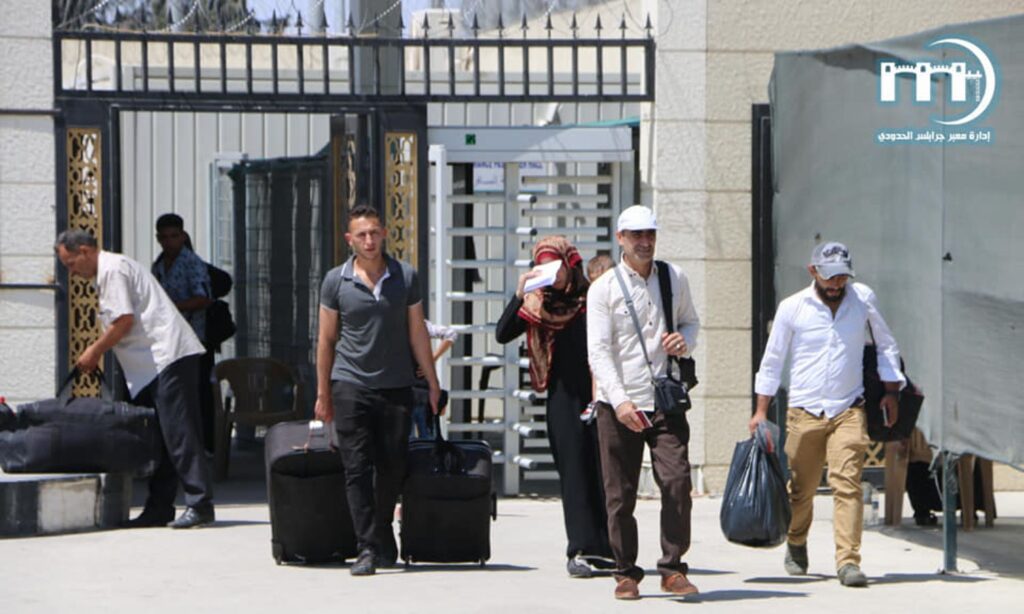For the third consecutive year, Syrians in Turkey are preparing for Eid with the renewed burden of being unable to visit their families in Syria, and spend the occasion with them this year as well, with the ongoing decision to cancel the previously open Eid vacations.
“Only death and illness could allow a Syrian in Turkey to visit his family in Syria this Eid, as well, without bearing an unaffordable financial cost,” related Salwa (52 years old), a resident of Istanbul from her current experience. She sought refuge in Turkey from Idlib province about eight years ago, fleeing the war and leaving her mother and siblings there.
Salwa found no way to visit Syria for free and to check on her brother Mohammed, who has a heart condition, except by submitting a special request (delekçe) to the governor of Istanbul accompanied by files proving her brother’s health condition. She is still waiting for the governor’s approval of the visit request and continues to inquire from the officials at the crossing whether the approval has been granted.
Salwa choked up as she spoke with Enab Baladi, saying, “We’re tired, over the past years I was used to visiting Syria during Eid to be with my family. It was like oxygen for us after all the hardship and tough circumstances we endure in exile, away from relatives; they’ve cut off our oxygen supply.”
Alternatives for some, burdens for others
Some Syrians found hope in the special vacations that local councils in Syria made available through the Jarablus crossing—a glimmer of hope for reuniting with their families. However, as these are confined to the Jarablus crossing in the east, which is more than 150 kilometers away from some of their areas in the north, it became a solution filled with obstacles.
For her part, 23-year-old Saba, who lives in Istanbul and comes from Idlib city, sees the politicization of such a humanitarian issue as “an additional disaster on Syrian refugees in Turkey,” in addition to the financial cost problem of the visit, which amounts to 200 US dollars per person.
A quick calculation by Saba, based on the number of family members, suggested the visit would cost up to 1200 dollars.
With a tone of bewilderment, she asked, “We are six people, is it reasonable to incur a cost of 1200 dollars for a visit to our homeland that doesn’t exceed one month?”
|
Are we tourists or going on holiday? Saba, a Syrian refugee in Istanbul |
Social and family impacts
Mohammed Abdul Razzaq (34 years old), living in the southern Turkish province of Hatay, is one of those eager to visit Syria during Eid to “kill two birds with one stone,” as he put it. He could visit his displaced family near Idlib to check on them and have his engagement in the presence of his family and relatives in Syria.
For Abdul Razzaq, who hails from Rif Dimashq province, it is impossible for his family or relatives to travel to Turkey to attend his engagement for various reasons, the most important of which are the prohibiting Turkish laws, in addition to the “large” financial costs.
Eid hopes for a new decision
Like others, Salwa hopes the rumors spread on social networks and platforms about the possibility of a new decision allowing Syrians to visit their country this Eid or a few days after might come true.
“They told me the governor’s vacation is only 15 days long, is that enough for me to see my family after being away for over a year?” Salwa added, who hopes that the Eid visit can again be made available twice a year, allowing her to check on her brother and attend family traditions during the Eid al-Adha there, perhaps.
While the media spokesperson for the Jarablus crossing confirmed to Enab Baladi the resumption of the crossing’s registration for local council vacations a few days ago and the entry of the first batch of Syrians coming from Turkey, he denied any new decision related to Eid visits from the Turkish side, deeming it unlikely to be issued soon due to the approaching holiday season dedicated to the crossing and its closure during this vacation.
On November 6, 2023, Turkey allowed Syrians residing on its territory to visit northwest Syria areas through the Jarablus border crossing for periods determined by the councils in exchange for paying fees that started at 100 dollars and currently reached 200 dollars.
Following the open-door policy adopted by the Turkish government towards Syrian refugees in 2014, it changed in 2016 by imposing a “visa” for their entry, then tightened after the closure resulting from the spread of the COVID-19 pandemic in 2020, and continued in 2022 to become a complete cancellation of Eid visits to date, for political reasons.
Under pressure from the Turkish opposition and its exploitation of the refugee issue on every occasion or electoral entitlement or internal crisis in Turkey, Syrians have been deprived of Eid vacations.

